英语拓展模块练习册Unit 6完形答案及译文
(完整版)英专综合教程6册课文翻译及课后答案Answertounit6
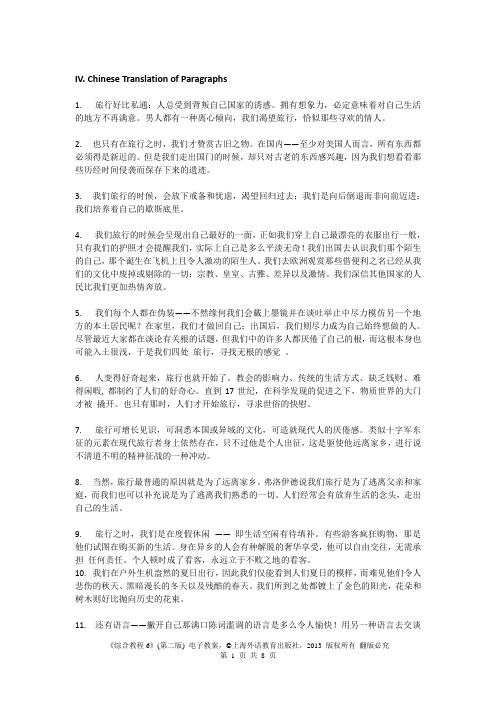
IV. Chinese Translation of Paragraphs1. 旅行好比私通:人总受到背叛自己国家的诱惑。
拥有想象力,必定意味着对自己生活的地方不再满意。
男人都有一种离心倾向,我们渴望旅行,恰似那些寻欢的情人。
2. 也只有在旅行之时,我们才赞赏古旧之物。
在国内——至少对美国人而言,所有东西都必须得是新近的。
但是我们走出国门的时候,却只对古老的东西感兴趣,因为我们想看看那些历经时间侵袭而保存下来的遗迹。
3. 我们旅行的时候,会放下戒备和忧虑,渴望回归过去;我们是向后倒退而非向前迈进;我们培养着自己的歇斯底里。
4. 我们旅行的时候会呈现出自己最好的一面,正如我们穿上自己最漂亮的衣服出行一般,只有我们的护照才会提醒我们,实际上自己是多么平淡无奇!我们出国去认识我们那个陌生的自己,那个诞生在飞机上且令人激动的陌生人。
我们去欧洲观赏那些借便利之名已经从我们的文化中废掉或剔除的一切:宗教、皇室、古雅、差异以及激情。
我们深信其他国家的人民比我们更加热情奔放。
5. 我们每个人都在伪装——不然缘何我们会戴上墨镜并在谈吐举止中尽力模仿另一个地方的本土居民呢?在家里,我们才做回自己;出国后,我们则尽力成为自己始终想做的人。
尽管最近大家都在谈论有关根的话题,但我们中的许多人都厌倦了自己的根,而这根本身也可能入土很浅,于是我们四处旅行,寻找无根的感觉。
6. 人变得好奇起来,旅行也就开始了。
教会的影响力、传统的生活方式、缺乏钱财、难得闲暇, 都制约了人们的好奇心。
直到17世纪,在科学发现的促进之下,物质世界的大门才被撬开。
也只有那时,人们才开始旅行,寻求世俗的快慰。
7. 旅行可增长见识,可洞悉本国或异域的文化,可造就现代人的厌倦感。
类似十字军东征的元素在现代旅行者身上依然存在,只不过他是个人出征,这是驱使他远离家乡,进行说不清道不明的精神征战的一种冲动。
8. 当然,旅行最普通的原因就是为了远离家乡。
弗洛伊德说我们旅行是为了逃离父亲和家庭,而我们也可以补充说是为了逃离我们熟悉的一切。
最新外研版英语八年级上册Module 6完形填空、阅读理解试题及答案
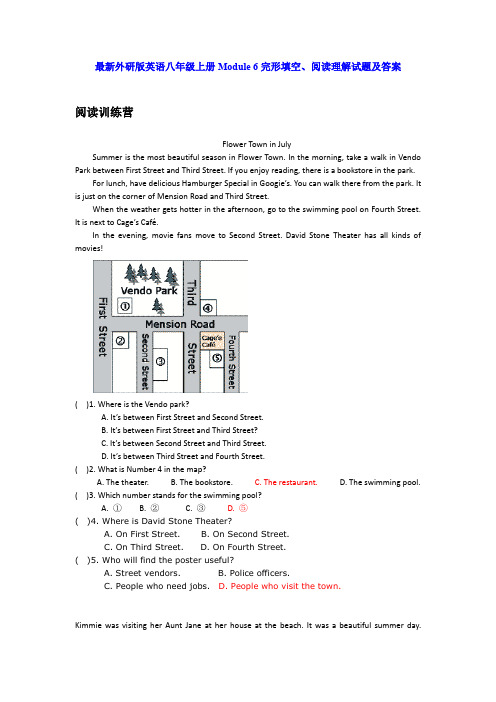
最新外研版英语八年级上册Module 6完形填空、阅读理解试题及答案阅读训练营Flower Town in JulySummer is the most beautiful season in Flower Town. In the morning, take a walk in Vendo Park between First Street and Third Street. If you enjoy reading, there is a bookstore in the park.For lunch, have delicious Hamburger Special in Googie’s. You can walk there from the park. It is just on the corner of Mension Road and Third Street.When the weather gets hotter in the afternoon, go to the swimming pool on Fourth Street. It is next to Ca ge’s Café.In the evening, movie fans move to Second Street. David Stone Theater has all kinds of movies!( )1. Where is the Vendo park?A. It’s between First Street and Second Street.B. It’s between First Street and Third Street?C. It’s between Second Street and Third Street.D. It’s between Third Street and Fourth Street.( )2. What is Number 4 in the map?A. The theater.B. The bookstore.C. The restaurant.D. The swimming pool. ( )3. Which number stands for the swimming pool?A. ①B. ②C. ③D. ⑤( )4. Where is David Stone Theater?A. On First Street.B. On Second Street.C. On Third Street.D. On Fourth Street.( )5. Who will find the poster useful?A. Street vendors.B. Police officers.C. People who need jobs.D. People who visit the town.Kimmie was visiting her Aunt Jane at her house at the beach. It was a beautiful summer day.Kimmie built a big sand castle in the morning. Aunt Jane took pictures of the castle to send to Kimmie’s parents.Kimmie wanted to play on the beach that afternoon. She wanted to build another sand castle. Aunt Jane told her it was too sunny. Aunt Jane said Kimmie could only go if she had a hat. Kimmie didn’t have a hat. Aunt Jane said that Kimmie could borrow one of hers.Kimmie tried on four hats.The pink one was really beautiful, but it had a big bow. The ribbons kept going into Kimmie’s eyes. That would not be good for building a sand castle.The blue hat was not beautiful. Kimmie did not like that hat at all.The red hat was nice, but it had flowers on it. Kimmie was afraid the flowers would get dirty.Then, Kimmie saw a big straw hat with a short red ribbon on it. The bow was not too droopy. It would be easy to clean. Kimmie knew it was the perfect hat.( )1. Where was Aunt Jane’s house?A. At the store.B. At the beachC. At schoolD. At home( )2. Why did Aunt Jane took pictures of the castle?A. She wanted to put it home.B. She wanted to send it to Kimmie.C. She wanted to send it to Kimmie’s father and mother.D. She wanted to send it to Kimmie’s grandpa.( )3. Why did Aunt Jane want Kimmie to wear a hat?A. To protect her from the rain.B. To protect her from the sun.C. To help her look better on the beach.D. The hat was Kimmie’s idea.( )4. Why didn’t Kimmie want to wear the pink hat?A. The bow was too big.B. It had a flower.C. It had a bird on it.D. It was dirty. ( )5. Which of the following is the best title of this passage?A. Aunt Jane’s house.B. Photos took on the beach.C. A happy afternoon.D. A perfect beach hat.Remember Tony and Peter, the twin brothers who started singing at the age of five? The little boys are now twenty-five years old and will come back home for the first time since they left ten years ago. They will be singing to celebrate the 100th birthday of our beautiful town.Tony and Peter are famous for their wonderful voices. They are popular with both young and old people. Three years ago the brothers organized the Garbage Can with their three cousins. The five of them started to write their own songs andhave become successful. In the coming concert in Greentown, the Garbage Can is going to sing their best-loved songs and several new ones.The concert will be at Apple Park at 7 p.m. on October 10. Fans who do not want to miss it should get to the park as early as possible.( )1. A. boys B. girls C. women D. students( )2. A. came B. left C. arrived D. reached( )3. A. miss B. remember C. forget D. celebrate( )4. A. clothes B. noises C. voices D. appearance( )5. A. both B. all C. none D. neither( )6. A. before B. later C. ago D. after( )7. A. stories B. songs C. books D. articles( )8. A. old B. new C. long D. short( )9. A. in B. at C. with D. on( )10. A. should B. might C. need D. myABDCA CBBDAToday is the first day of winter vacation. I'm very excited because Chinese New Year is coming. Mom told me this morning that we are going to Grandmother's place for the New Year. Dad won't be back from Tokyo before the holidays are over. It has been two weeks since Dad left. I miss him so much.Mom went shopping for food and presents, so I took Lucy and Annie to the library. We stayed at the Children's Reading Room all the afternoon. We found some books about animals we were interested in. After we left the library, we went to Mendy's to buy hamburgers and fries. I was hungry, but I didn't eat much. The doctor told me that I am too fat. I have lost two kilos in the last two weeks. I hope I can lose six kilos before summer comes.1. because2. told3. over4. miss5. shopping6. Reading7. found8. left9. hungry 10. LostSnow can be very beautiful. When snow covers everything around you, the world looks like a “Winter Wonderland”. That is the name of a very popular song about winter. Richard Smith and Felix Bernard wrote the song in 1934.But winter is not always such a beautiful and happy time. It is cold outside. The wind blows and makes it even colder. The days are shorter and darker. The sun rarely shines. The leaves on the trees are brown or have fallen to the ground. The flowers are mostly gone. It is not surprising that some people are sad in winter. And some people dream about being somewhere else where it is warm and pretty—like the state of California. The Mamas and the Papas recorded their famous song “California Dreaming” in 1965.During the 1960s, many other famous rock groups sang songs about winter. Here is a song by Simon and Garfunkel called “A Hazy Shade of Winter”. They sing about life and hope.In 1968, the group Blood, Sweat and Tears recorded this gentle, sad song about winter. They sing about a lost love and forgotten memories in “Sometimes in Winter”.Gordon Lightfoot wrote and recorded another sad and lovely song about winter in 1975. Sarah Mclachlan recorded “Song for a Winter’s Night” for an album in 2006. She sings about reading a love letter and wishing the writer were with her.The AssignmentJessie walked into her English class and sat down. Mr. Smith told the students to copy the writing assignment from the board.Jessie was feeling sick. She needed to ask Mr. Smith if she could go see the nurse. First she wanted to write down the assignment. She quickly copied the assignment. Then she asked Mr. Smith if she cold go to the nurse. He excused her for class.1. In this selection, the word excused means ___.A. read someone a storyB. wrote a paperC. let someone leaveD. asked for2. What should Jessie do on Friday?A. Give her paper to Mr. Smith.B. Choose a new story to read.C. Tell the class about a character.D. Leave class early.3. Why does Jessie want to leave class?A. She doesn’t like the story.B. she hasn’t done the assignment.C. She feels sick.D. She can’t find her book.4. In this selection, Mr. Smith is probably Jessie’s ___.A. friendB. fatherC. doctorD. teacher5. According to the chart on the board, what should Jessie do first?A. Choose a character.B. Start writing her paper.C. Revise her paper.D. Read a story.。
高中英语外研版选修6练习:Module 6 War and Peace 6-2 含解析

课后演练提能[夯实·基础知识]Ⅰ. 用括号中所给词的适当形式填空1. The guard of the meeting insisted that everybody ________(obey) the rules.答案:(should) obey2. -You should have gone to the cinema with us yesterday. The film was very good.-I wish I ________(have) yesterday off.答案:had had3. The teacher ordered that students ________(not smoke).答案:(should) not smoke4. I'd rather you ________(tell) my parents about this earlier.答案:told5. I've been too busy recently, otherwise I ________(write) to you two days ago.答案:would/could/might have written6. It is suggested that another hospital________(build) in the centre of the city.答案:(should) be builtⅡ. 完成句子1. If they ________ us, we would be there now.如果他们通知我们,我们现在就到那儿了。
答案:had informed2. They began to talk warmly as if they ________ each other for ages.他们开始热情地交谈,好像认识很久了。
答案:had known3. ________,we would still be working now.要不是你的帮助,我们现在仍然在工作。
职高英语拓展模块 第六单元Unit 6 Chinese Heritage.wps 练习题
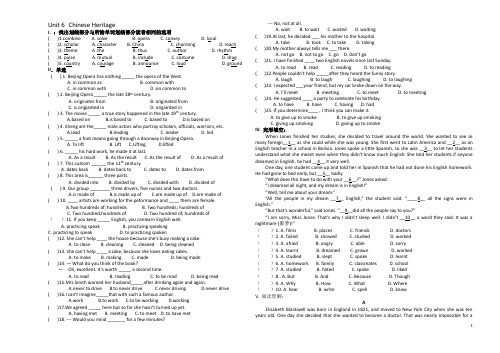
Unit 6 C hinese HeritageI. :找出划线部分与所给单词划线部分读音相同的选项( )bine A. solve B. opera C. convey D. local( )2. scholar A. character B. China C. charming D. reach ( )3. theme A .the B. thus C. author D. rhythm ( )4. pulse A. mutual B. include C. costume D. drug ( )5. country A. courage B. announce C. loud D. ground II.单选( ) 1. Beijing Opera has nothing _____ the opera of the West.A. in common asB. common withC. in common with D .on common to( ) 2. Beijing Opera _____ the late 18th century.A. originates fromB. originated fromC. is origianted inD. origianted in( ) 3. The movie _____ a true story happened in the late 19th century.A.based onB.is based toC. based toD.is based on( ) 4. Sheng are the_____ male actors who portray scholars, officials, warriors, etc.A.leadB.leadingC. leaderD. led( ) 5. _____ a foot means going through a doorway in Beijing Opera.A. To liftB. LiftC.LiftingD.lifted( ) 6. _____ his hard work, he made it at last.A. As a resultB. As the resultC. As the result ofD. As a result of( ) 7. This custom ______ the 11th century.A. dates backB. dates back toC. dates toD. dates from( ) 8. This area is______ three parts.A. divided intoB. divided byC. divided withD. divided of( ) 9. Our group ________ three drivers, five nurses and two doctors.A.is made ofB.is made up ofC.are made up ofD.are made of( ) 10. ____ artists are working for the peformance and ____ them are female.A.Two hundreds of; hundredsB. Two hundreds; hundreds ofC. Two hundred;hundreds ofD. Two hundred of; hundreds of()11. If you keep _____ English, you canlearn English well.A. practicing speakB. practicing speakingC. practicing to speakD. to practicing spoken( )12. She can’t help ____ the house because she’s busy making a cake.A. to cleanB. cleaningC. cleanedD. being cleaned( )13. She can’t help ____ a cake, because she loves eating cakes.A. to makeB. makingC. madeD. being made( )14. — What do you think of the book?—Oh, excellent. It’s worth _____ a second time.A. to readB. readingC. to be readD. being read( )15.Mrs.Smith warned her husband_____after drinking again and again.A.never to driveB.to never driveC.never drivingD.never drive ( )16.I can’t imagine_____th at with such a famous author.A.workB.to workC.to be workingD.working( )17.We agreed _____ here but so far she hasn’t turned up yet.A. having metB. meetingC. to meetD. to have met( )18. --- Would you mind _______ for a few minutes?--- No, not at all.A. waitB. to waitC. waitedD. waiting( )19.At last, he decided ___ his mother to the hospital.A. takeB. tookC. to takeD. taking( )20.My mother always tells me ___ there.A. not goB. not to goC. goD. don’t go( )21. I have finished ____ two English novels since last Sunday.A. to readB. readC. readingD. to reading( )22.People couldn’t help _____after they heard the funny story.A. laughB. to laughC. laughingD. to laughing( )23. I expected ___your friend, but my car broke down on the way.A. I’ll meetB. meetingC. to meetD. to meeting( )24. He suggested ____ a party to celebrate his birthday.A. to haveB. haveC. havingD. had( )25. If you determine____ , I think you can make it.A. to give up to smokeB. to give up smokingC. giving up smokingD. giving up to smokeIV. 完形填空:When Jones finished her studies, she decided to travel around the world. She wanted to see as many foreign__1__ as she could while she was young. She first went to Latin America and __2__ as an English teacher in a school in Bolivia. Jones spoke a little Spanish, so she was __3__ to let her students understand what she meant even when they didn’t know much English. She told her students if anyone dreamed in English, he had __4__ it very well.One day, one student came up and told her in Spanish that he had not done his English homework. He had gone to bed early, but __5__ badly.“What does this have to do with your __6__?” Jones asked.“I dreamed all night, and my dream is in English!”“Well, tell me about your dream.”“All the people in my dream __7__ English,” the student said. “____8__ all the signs were in English.”“But that’s wonderful,” said Jones. “__9__did all the people say to you?”“I am sorry, Miss Jones. That’s why I didn’t sleep well. I didn’t __10__ a word they said. It was a nightmare (噩梦)!”()1. A. films B. places C. friends D. doctors()2. A. failed B. showed C. studied D. worked()3. A. afraid B. angry C. able D. sorry()4. A. learnt B. dreamed C. grown D. worked()5. A. studied B. slept C. spoke D. learnt()6. A. homework B. family C. classmates D. school()7. A. studied B. hated C. spoke D. liked()8.. A. But B. And C. Because D. Though()9. A. Why B. How C. What D. Where()10. A. hear B. write C. spell D. knowV. 阅读理解:AElizabeth Blackwell was born in England in 1821, and moved to New York City when she was ten years old. One day she decided that she wanted to become a doctor. That was nearly impossible for awoman in the middle of the nineteenth century. After writing many letters asking for admission(录取) to medical schools, she was finally accepted by a doctor in Philadelphia. She was so determined that she taught school and gave music lessons to get money for the cost of schooling.In 1849, after graduation from medical school,she decided to further her education in Paris. She wanted to be a surgeon(外科医师) , but a serious eye problem forced her to give up the idea.Upon returning to the United States, she found it difficult to start her own practice because she was a woman. By 1857 Elizabeth and her sister, also a doctor, along with another woman doctor, managed to open a new hospital, the first for women and children. Besides being the first woman physician and founding her own hospital, she also set up the first medical school for women.()1. Why couldn’t Elizabeth Blackwell realize her dream of becoming a surgeon?A. She couldn’t get admitted to medical schoolB. She decided to further her education in ParisC. A serious eye problem stopped herD. It was difficult for her to start a practice in the United States()2. What main obstacle(障碍) almost destroyed Elizabeth’s chances for becoming for a doctor?A. She was a woman.B. She wrote too many letters.C. She couldn’t graduate from medical school.D. She couldn’t set up her hospital.()3. How many years passed between her graduation from medical school and the opening of her hospital?A. Eight yearsB. Ten yearsC. Nineteen yearsD. Thirty-six years()4. According to the passage, all of the following are “firsts” in the life of Elizabeth Blacekwell, except that she ______.A. became the first woman physicianB. was the first woman doctorC. and other women founded the first hospital for women and childrenD. set up the first medical school for women()5. Eilzabeth Blackwell spent most of her lift in _______.A. EnglandB. ParisC. the United StatesD. New York CityBWe know that many animals do not stay in one place. Birds, fish and other animals move from one place to another at a certain time. They move for different reasons: most of them move to find food more easily, but others move to get away from places that are too crowded. When cold weather comes, many birds move to warmer places to find food. Some fishes give birth in warm water and move to cold water to feed. The most famous migration (迁移) is probably the migration of fish, which is called "salmon". This fish is born in fresh water but it travels many miles to salt water. There it spends its life. When it is old, it returns to its birthplace in fresh water. Then it gives birth and dies. In northern Europe, there is a kind of mouse. They leave their mountain homes when they become too crowded. They move down to the low land. Sometimes they move all the way to the seaside, and many of them are killed when they fall into the sea.Recently (近来), scientists have studied the migration of a kind of lobster (龙虾). Every year, when the season of the bad weather arrives, the lobsters get into a long line and start to walk across the floor of the ocean. Nobody knows why they do this, and nobody knows where they go.So, sometimes we know why humans and animals move from one place to another, but at other times we don't. Maybe living things just like to travel.( )6. Most animals move from one place to another at a certain time to _____.A.give birthB. enjoy warmer weatherC. find food more easilyD. find beautiful places( )7. The fish called "salmon" spends a long time in ____.A. salt waterB. riversC. fresh waterD. its birthplace( )8. The mice in northern Europe move when _____.A. they give birthB. the place gets too crowdedC. the weather is badD. they haven't enough food( )9. The lobsters move _____.A. to the fresh waterB. at a certain timeC. to the underseaD. to find more food( )10. What is the main idea of the passageA.Animals move to find food more easily.B.The migration of the fish called "salmon" is the most famous migration.C.Living things move from one place to another because they like to travel.D. Sometimes we know why and how living things move from one place to another, butsometimes we don't.。
高中二年级课后拓展训练(英语第6章含解析)
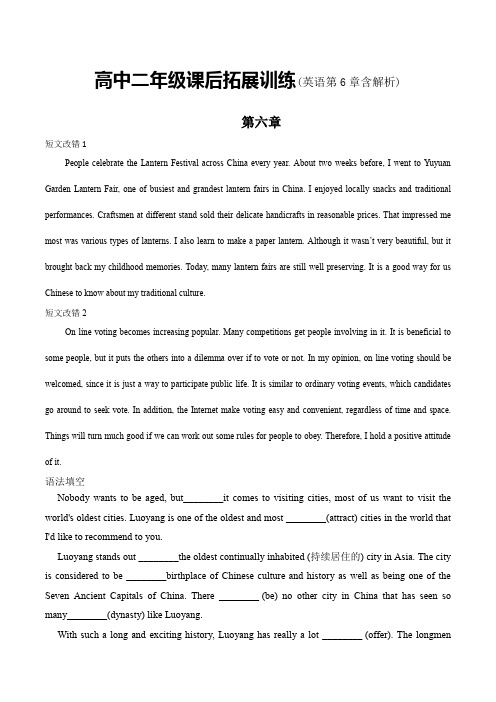
高中二年级课后拓展训练(英语第6章含解析)第六章短文改错1People celebrate the Lantern Festival across China every year. About two weeks before, I went to Yuyuan Garden Lantern Fair, one of busiest and grandest lantern fairs in China. I enjoyed locally snacks and traditional performances. Craftsmen at different stand sold their delicate handicrafts in reasonable prices. That impressed me most was various types of lanterns. I also learn to make a paper lantern. Although it wasn’t very beautiful, but it brought back my childhood memories. Today, many lantern fairs are still well preserving. It is a good way for us Chinese to know about my traditional culture.短文改错2On-line voting becomes increasing popular. Many competitions get people involving in it. It is beneficial to some people, but it puts the others into a dilemma over if to vote or not. In my opinion, on-line voting should be welcomed, since it is just a way to participate public life. It is similar to ordinary voting events, which candidates go around to seek vote. In addition, the Internet make voting easy and convenient, regardless of time and space. Things will turn much good if we can work out some rules for people to obey. Therefore, I hold a positive attitude of it.语法填空Nobody wants to be aged, but________it comes to visiting cities, most of us want to visit the world's oldest cities. Luoyang is one of the oldest and most ________(attract) cities in the world that I'd like to recommend to you.Luoyang stands out ________the oldest continually inhabited (持续居住的) city in Asia. The city is considered to be ________birthplace of Chinese culture and history as well as being one of the Seven Ancient Capitals of China. There ________(be) no other city in China that has seen so many________(dynasty) like Luoyang.With such a long and exciting history, Luoyang has really a lot ________(offer). The longmenGrottoes(龙门石窟), which ________(include) in the world Heritage List since 2000, and many historic Buddhist temples________(constant) attract tourist from all over the world. Luoyang is also famous for the White Horse Temple, the earliest Buddhist temple ________(build) in China. Are you anxious to visit the city?阅读下面材料,在空白处填入1个适当的单词或括号内单词的正确形式。
中职教材英语(拓展模块)教学课件U6

听力原文
A: Hello, I am a policewoman. Your neighbour has complained that you are making too much noise. B: How’s that? A: He called to tell us that you often hold parties at your house. We were told the noise was loud enough to wake the dead. B: In fact, I do hold parties sometimes, but not frequently. What’s more, we just play the music loud enough for ourselves to enjoy. A: Anyhow, you’re forbidden to disturb a residential area with noise. You can take your friends to recreational areas and entertain them there. B: OK, Madam, I’ll take your advice.
Text A
1. Learn these words and expressions. food in tide
economy topic
involve carbon dioxide
高中英语外研版选修6强化练习:Module 6 Section 1 含解析(精修版)

外研版英语精品资料(精修版)Module 6Section ⅠⅠ.完形填空[2013·大纲全国卷]Michael Greenberg is a very popular New Yorker. He is not famous in sports or the arts. But people in the streets '1'him, especially W1 those who are__2__.For those people, he is “Gloves” Greenberg. How did he get that___3__?He looks like P1 any other businessman, w earing W2 a suit and carrying a briefcase(公文箱). But he's__4__. His briefcase always has some gloves.In winter, Mr. Greenberg does not___5__ like other New Yorkers, who look at the sidewalk and__6__ the street. He looks around P2 at __7__. He stops when he___8__ someone with no gloves. He gives them a pair and then he___9__,looking for more people with cold __10___.On winter days, Mr. Greenberg __11__ gloves. During the rest of the year,he__12__ gloves. People who have heard about P3 him___13__him gloves, and he has many in his apartment(公寓).Mr. Greenberg___14__ doing this 21 years ago. Now, many poor New Yorkers know him and__15__ his behavior(行为). But people who don't know him are sometimes__16__ him. They don't realize W3 that he just wants to make them___17__.It runs in the__18__. Michael's father always helped the poor as he belie v ed W4 it made everyone happier. Michael Greenberg feels the __19__. A pair of gloves may be a___20__ thing,but it can make a big difference P4 in winter.1. A. know about B. learn fromC. cheer forD. look after2. A. old B. busyC. kindD. poor3. A. job B. nameC. chanceD. message4. A. calm B. differentC. crazyD. curious5. A. act B. soundC. feelD. dress6. A. cross over B. drive alongC. hurry downD. keep off7. A. cars B. peopleC. street numbersD. traffic lights8. A. helps B. choosesC. greetsD. sees9. A. holds up B. hangs outC. moves onD. turns around10. A. hands B. earsC. facesD. eyes11. A. searches for B. stores upC. gives awayD. puts on12. A. borrows B. sellsC. returnsD. buys13. A. call B. sendC. lendD. show14. A. delayed B. rememberedC. beganD. enjoyed15. A. understand B. dislikeC. studyD. excuse16. A. sorry for B. satisfied withC. proud ofD. surprised by17. A. smart B. richC. specialD. happy18. A. city B. familyC. neighborhoodD. company19. A. honor B. painC. sameD. cold20. A. small B. usefulC. delightfulD. comforting本文为记叙文,题材为人物故事类。
英语拓展模块练习册Unit 6完形答案及译文
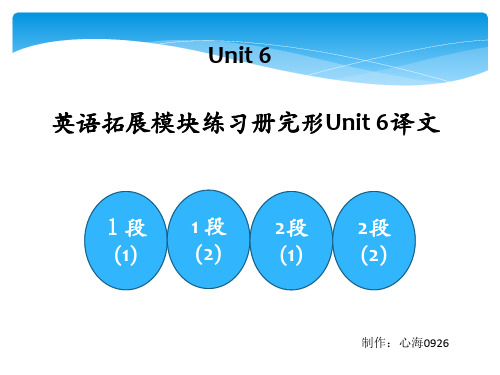
几个世纪以来,特别是从公元第七到第十 四世纪,中国拥有世界上最先进的文明。
返回首页
(Inventions) such as paper, printing, gunpowder, porcelain, silk, and the compass originated in China and then spread to other parts of the world. China’s success beginning under the great Tang dynasty (618-907) would prove to be the longest lasting period of success in world (history). Indeed, the Tang dynasty (is regarded) by many historians as the most glorious period of China在这几年中拥有过最大的权力,为 中国建立了一个格局。
返回首页
The years during which the Tang Empire experienced its greatest power established a pattern for China. It continued throughout the Song and Ming dynasties into early modern (times) . Tang rule set a standard mark on many facts of Chinese life, (including) literature and the arts. For this reason, Tang China was admired and copied by many other peoples.
(完整版)英专综合教程6册课文翻译及课后答案Answertounit6
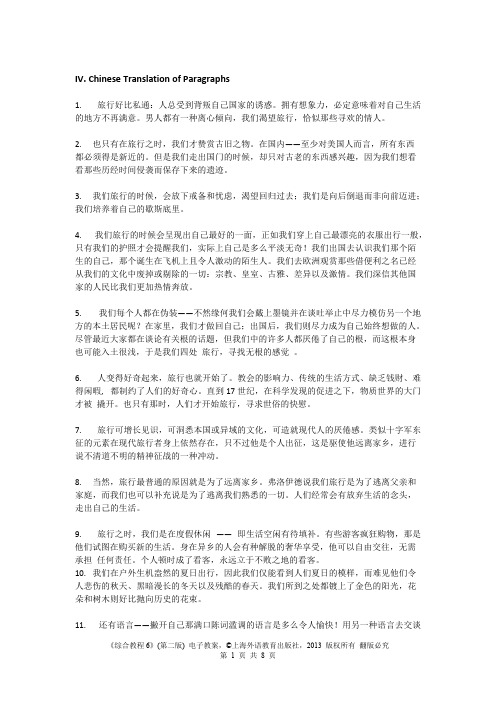
IV. Chinese Translation of Paragraphs1. 旅行好比私通:人总受到背叛自己国家的诱惑。
拥有想象力,必定意味着对自己生活的地方不再满意。
男人都有一种离心倾向,我们渴望旅行,恰似那些寻欢的情人。
2.也只有在旅行之时,我们才赞赏古旧之物。
在国内——至少对美国人而言,所有东西都必须得是新近的。
但是我们走出国门的时候,却只对古老的东西感兴趣,因为我们想看看那些历经时间侵袭而保存下来的遗迹。
3.我们旅行的时候,会放下戒备和忧虑,渴望回归过去;我们是向后倒退而非向前迈进;我们培养着自己的歇斯底里。
4. 我们旅行的时候会呈现出自己最好的一面,正如我们穿上自己最漂亮的衣服出行一般,只有我们的护照才会提醒我们,实际上自己是多么平淡无奇!我们出国去认识我们那个陌生的自己,那个诞生在飞机上且令人激动的陌生人。
我们去欧洲观赏那些借便利之名已经从我们的文化中废掉或剔除的一切:宗教、皇室、古雅、差异以及激情。
我们深信其他国家的人民比我们更加热情奔放。
5. 我们每个人都在伪装——不然缘何我们会戴上墨镜并在谈吐举止中尽力模仿另一个地方的本土居民呢?在家里,我们才做回自己;出国后,我们则尽力成为自己始终想做的人。
尽管最近大家都在谈论有关根的话题,但我们中的许多人都厌倦了自己的根,而这根本身也可能入土很浅,于是我们四处旅行,寻找无根的感觉。
6. 人变得好奇起来,旅行也就开始了。
教会的影响力、传统的生活方式、缺乏钱财、难得闲暇, 都制约了人们的好奇心。
直到17世纪,在科学发现的促进之下,物质世界的大门才被撬开。
也只有那时,人们才开始旅行,寻求世俗的快慰。
7. 旅行可增长见识,可洞悉本国或异域的文化,可造就现代人的厌倦感。
类似十字军东征的元素在现代旅行者身上依然存在,只不过他是个人出征,这是驱使他远离家乡,进行说不清道不明的精神征战的一种冲动。
8.当然,旅行最普通的原因就是为了远离家乡。
弗洛伊德说我们旅行是为了逃离父亲和家庭,而我们也可以补充说是为了逃离我们熟悉的一切。
职高英语拓展模块(1-6单元)题库
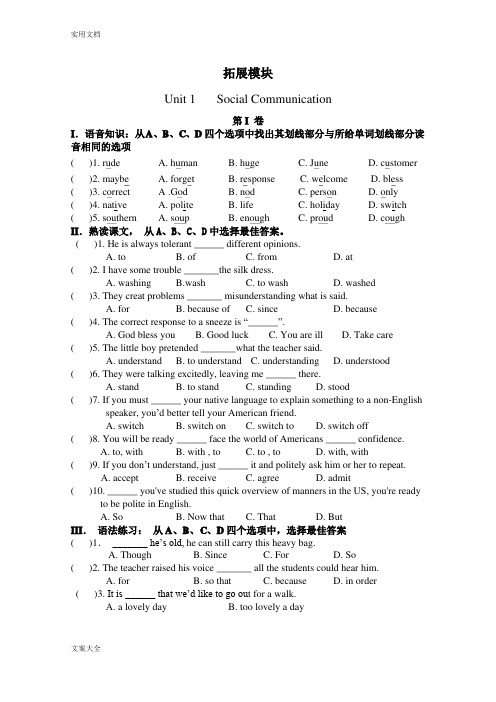
拓展模块Unit 1Social Communication第I卷I.语音知识:从A、B、C、D四个选项中找出其划线部分与所给单词划线部分读音相同的选项()1. rude A. human B. huge C. June D. customer()2. maybe A. forget B. response C. welcome D. bless ()3. correct A .God B. nod C. person D. only()4. native A. polite B. life C. holiday D. switch ()5. southern A. soup B. enough C. proud D. cough II.熟读课文,从A、B、C、D中选择最佳答案。
()1. He is always tolerant ______ different opinions.A. toB. ofC. fromD. at()2. I have some trouble _______the silk dress.A. washingB.washC. to washD. washed()3. They creat problems _______ misunderstanding what is said.A. forB. because ofC. sinceD. because()4. The correct response to a sneeze is“______”.A. God bless youB. Good luckC. You are illD. Take care()5. The little boy pretended _______what the teacher said.A. understandB. to understandC. understandingD. understood()6. They were talking excitedly, leaving me ______ there.A. standB. to standC. standingD. stood()7. If you must ______ your native language to explain something to a non-English speaker, you’d better tell your American friend.A. switchB. switch onC. switch toD. switch off()8. You will be ready ______ face the world of Americans ______ confidence.A. to, withB. with , toC. to , toD. with, with()9. If you don’t understand, just ______ it and politely ask him or her to repeat.A. acceptB. receiveC. agreeD. admit()10. ______ you've studied this quick overview of manners in the US, you're ready to be polite in English.A. SoB. Now thatC. ThatD. ButIII.语法练习:从A、B、C、D四个选项中,选择最佳答案()1._______ he’s old, he can still carry this heavy bag.A. ThoughB. SinceC. ForD. So()2. The teacher raised his voice _______ all the students could hear him.A. forB. so thatC. becauseD. in order()3.It is ______ that we’d like to go ou t for a walk.A. a lovely dayB. too lovely a dayC. so lovely a dayD. such lovely a day()4. Mary had ______ much work to do that she stayed at her office all day.A. suchB. soC. tooD. very()5. _____ she goes, there are crowds of people waiting to see her.A. WhereverB. HoweverC. WhicheverD. Whoever()6. You must speak louder ______ you can be heard by all.A. so thatB. in order toC. becauseD. such that()7. ______ well you can drive, you must drive carefully.A. So long asB. In order thatC. No matter howD. The moment()8. If we work with a strong will, we can overcome any difficulty, ____great it is.A. whatB. howC. whateverD. however()9._______ he’s very young, _______ he knows several languages.A. Though, butB. Because, soC. Though, /D. Because, / ()10. _____ I suggest, he always disagrees.A. HoweverB. WhateverC. WhicheverD. WhoeverIV.完形填空:Last summer, my wife Jane and I went to visit the town where we both grew up. We 1there since we were married ten years ago.2,we went to the neighborhood where my wife spent her childhood.It hadn’t changed very much. The house3she was born was still there, but it was now a different color. The same neighbors still lived next door. They were very glad to 4Jane, and asked us to come in and have a cup of coffee. We learned about all the neighbors, old and new. Jane had a very good5. As fast as one question was answered, she would ask the next. “What happened6the Dunbars who used to have the little yellow house on the corner?”,“Who bought the old Johnson place in the next block?”,“Do Fred and Martha still live down the street?”,“What about Miss Burton who7in that extremely big house around the corner?”Then we went to see the neighborhood where I grew up. What a8! It was all changed. All the old houses I remembered were9and in their place were some very modern ones. I didn’t know any of the people who10there.() 1.A. hadn’t been B. wasn’t C. haven’t been D. didn’t be() 2. A. At the very beginning B. First C. Firstly D. For the first time() 3. A. that B. / C. where C. which() 4. A. find B. know C. meet D. see() 5.A. time B. ask C. home D. question() 6. A. with B. to C. for D. about() 7. A. live alone B. lives lonely C. lived alone D. stayed lonely() 8. A. disappoint B. disappointing C. disappointed D. disappointment () 9.A. gone B. ruins C. there D. the same() 10. A. worked B. stayed C. studied D. livedV.阅读理解AEducation for Japanese children is free for the first nine years and all children must go to school six years of primary schooling and three years of secondary schooling. In the primary and secondary schools,about99.9per cent of school-age children are present. School usually begins at 8 o'clock in the morning and ends at 3 o'clock in the afternoon on weekdays and at noon on Saturdays. The school begins in April and ends in March. There is a summer holiday in August and a winter holiday during the New Year season.After nine years of schooling,students can enter the three-year high school by passing an examination and by paying a small charge each year.After high school, students can go on to study at various types of colleges, usually for four years. There are also two-year junior colleges.() 1. The passage mainly discusses about ______.A.colleges in JapanB.free education in Japancation in Jap anD.school time in Japan() 2. How many days have the Japanese students to go to school every week?A.Not known.B.Four and half days.C.Five days.D.Five and a half days.() 3. If a student wants to go to a high school in Japan, he or she must ______.A.pay a large amount of moneyB.study at primary and secondary school for 9 yearsC.take part in (参加) the exam and pay a little moneyD.pass the exam and pay a little money() 4. What is mentioned in the passage?A.Types of colleges.B.Perio ds for different schoolings.C.The teaching staff (教职员工).D.The number of children attending schools.() 5. According to the passage what is true?A.Almost all Japa nese children have school education.B.Japanese schools have three vacationsC.Japanese children have freedom to choose schools.D.Weekdays are from Monday to Sunday.BFrom a plane we can see the fields, cities, mountains or seas below. If we go intospace, we see more and more of the earth. People and man-made satellites have been sent out into space to look at the earth carefully and people have learnt more about the earth in the last few years.The sea looks very beautiful when the sun is shining on it.But it can be very terrible when there is a strong wind.The sea is very big. It nearly covers three quarters of the earth. The sea is also very deep in some places. There is one place and at that place the sea is about 11 kilometers deep. The highest mountain in the world is about9 kilometers high.If that mountain was put into the sea at that place, there would be still 2 kilometers of water above it!In most parts of the sea, there are many kinds of fishes and plants. Some live near the top of the sea. Others live deep down. There are also a lot of small living things, and lots of fishes live by eating them.The sea can be very cold.When people go down,the sea becomes colder and colder.Only some men can go down into the deep sea.But,in1970,five women scientists (科学家) lived in the deep sea for fourteen days.()6. This passage is_________.A. a short storyB. for science readingC. a piece of newsD. a report()7. The sea covers about _______of the earth.A One third B. One fourthC. Two quartersD. Three fourths()8. _______are not mentioned (提及) in this passage.A. IslandsB. FishesC. PlantsD. Living things()9. Which of the following is NOT true?A. The sea is usually beautiful when the sun is shining.B. The sea is always very terrible when the wind blows hard.C. The highest mountain is in the deepest place of the sea.D. The deeper the people go into the sea, the colder they will feel.()10. The last sentence “But, in 1970, five women scientists live d in the deep sea for fourteen days.” means that________.A. women wanted to live in the deep sea for a long timeB. women could go deeper into the sea than menC. women liked living in the deep sea better than menD. women could do the same work as men第II卷I.单词拼写:根据下列句子及所给汉语注释,在横线上写出单词的正确形式1. No matter what we said, he______(假装)that he knew nothing about it.2. The ________(观众) enjoyed every minute of the performance.3. The naughty boy ________(承认)that did it with his father’s help.4. Sorry,I can’t __________(解释)why I am engaged in that job.5. The best way to practice English is to talk with a _________(本国的) speaker. II.词形变换:用括号内单词的适当形式填空1.I became________(annoy)when I felt that he pretended to understand what Imeant.2.He _____(polite)asked the man to give a correct response.3.Work hard and you’ll have _________ (confident ) to face the challenge of life.4.The boy felt _____(lose)when he heard something he didn’t understand.5.She created some problems because of _______(misunderstand) what her boss said. III.词义搭配:从B栏中选出A栏单词的正确解释A B() 1.tolerant A. man, woman or child, not an animal() 2. rude B. say or do something again() 3. native C. sudden burst of air from the nose and mouth() 4. repeat D. accepting what one doesn’t like() 5. human E. belonging to or being the place of one’s birth() 6. conversation F. fit, right() 7. admit G. informal talk() 8. sneeze H. agree to the truth of usually something bad() 9. suitable I. an answer or an action done in answer() 10. response J. not politeIV.补全对话。
上海版牛津英语6A Unit 6拓展阅读和答案

Peter Black goes to school on foot every day. A poor man usually sits on the side of the road with an old dog. There’s a piece of paper around the dog’s neck, saying: ‘I’m blind.’Peter is a kind boy. He often stops and puts a little money in a bowl before the poor man. The poo r man usually doesn’t say anything.One day, Peter was very busy, so he didn’t stop before him. The poor man stood up and ran after him, ‘You forgot to give me some money, sir.’Peter was very surprised, ‘You are a blind man, but how can you run after me?’ The poor man said, ‘No, I’m not blind, but my dog is.’A Vocabulary█ Fill in the blanks with the words in the box.Word box neck n . 脖子blind adj. 瞎的run after 追逐1I am so ___________ to see Mr Smith in Shanghai.2 A __________ man can’t see anything.3Don’t sit _______________ the chair. You may fall over!4Mrs Peterson goes to work __________ for she enjoys walking.5I saw a policeman _________________ a thief (小偷) on my way to school.B Comprehension█Choose the best answer.1 The poor man sits beside the road because he wants to _____________.A) get some food B) have a restC) ask for money D) talk with people2 Peter always stops, because _____________.A) he likes the dog B) he is a kind manC) he likes to talk with the poor man D) the dog is blind3 Peter often gives some money to ____________.A) the poor man B) the dogC) the bowl D) some people on the road4 Peter was surprised because ______________.A) the poor man could see him B) the poor man had a dogC) the poor man could hear him talking D) the poor man could stand up5 The poor man was ________.A) kind B) foolish C) honest D) not honest On My Way to SchoolSuggested questions:●How do you go to school?●How long does it take you to go to school?●What do you often see on your way to school?●Do you often help others on your way to school? How do you help them?Coming back to schoolAn American officer of 50 came back to his old school. The headmaster asked him to give a talk to the small pupils there. The talk was about the love of their great country. The little ones were all waiting in a large meeting-room. The old officer went up and began speaking. He said, ‘Boys and girls, I was at this school forty years ago. When I was a child, we were not as happy as you are today. Think about it and a nswer me, why are you so happy now?’Nobody answered. The officer waited for a long time. Then a short boy in the front put up his dirty hand. ‘Good boy! Please answer, dear,’ said the old officer.With a big smile on his face, the boy stood up and said, ‘If you speak long enough, we won't have to have maths and English this morning. That's why we are all so happy now.’Word box officer n 官员 as … as 与……一样think about 考虑 enough adv. 足够A Vocabulary█Fill in the blanks with the words in the box.1Mr. Clinton works as an _____________ in the army.2Tim is old __________ to go to school.3 A policeman will _____________ to us about the traffic rules. 4____________ the question carefully before you answer it.5Lucy is _________ tall ________ his mother now.B Comprehension█Answer the following questions1What did the headmaster ask the officer to do?______________________________________________________ 2The talk was about the love of America, wasn’t it?______________________________________________________ 3Where did the officer give his talk?______________________________________________________ 4How old was the officer when he studied in that school?_______________________________________________________ 5Do you think the boy’s answer will make the officer pleased?______________________________________________________Group discussionWhat will our school be like in 20 years’ time?What changes do you like to see in your school?What would you like to tel l your schoolmates in 20 years’ time?Going to school in a new townand his classmates were having a lesson, the teacher called Tom to come up to her desk and began to ask him a lot of questions, but Tom couldn't answer any of them. The teacher then decided to ask him some very easy questions so that he could get a few right.‘Where is the Great Wall?’ she said.Tom thought for some time and then answered, ‘In Egypt.’‘No, it is in China,’ the teacher said. She was getting a little angry now, but she was trying not to show it. Then she asked, ‘Who is the first pr esident of the United States?’Tom thought for a long time, but didn't say anything. Then the teacher got angry and shouted, ‘George Washington!’ To m turned back and immediately began to walk towards his seat. ‘Come back!’ the teacher said, ‘I didn't tell you to go.’‘Oh, I'm sorry,’ Tom said, ‘I thought you were calling another student.’Word box recently ad 最近 Egypt n. 埃及president n. 总统 immediately adv. 立刻A Vocabulary█ Fill in the blanks with the words in the box.1 Have you seen Mr. Roberson ____________?2 When I entered the restaurant, a waitress walked _________ me with a smile.3 Lincoln was the Sixteenth _____________ of the United States.4 The pyramid (金字塔)is in ______________.5 He stood up ___________ when he saw his boss enter the office. B Comprehension█ Tick True or FalseTrue False1 Tom and his classmates were having an English lesson.2 Tom’s teacher decided to ask him very easy questions because Tom was a new student in the class. ⏹ ⏹ ⏹ ⏹3 Tom co uld answer none of his teacher’s questions.⏹ ⏹ 4 ‘She was getting a little angry now, but she was trying not to show it .’ Here it means “She was getting a little angry.”⏹⏹5 George Washington is the first president of the United States.⏹ ⏹A SurveyUnit 6 Going to schoolA Vocabulary1 surprised2 blind3 on the side of4 on foot5 running afterB Comprehension1 C2 B3 A4 A5 A6 DPassage 2A Vocabulary1 officer2 enough3 give a talk4 Think about5 as … asB Comprehension1 To give a talk to the pupils there.2 Yes, it was.3 In a large meeting room.4 About ten years old.5 No, I d on’t think so.Passage 3A Vocabulary1 recently2 towards3 president4 Egypt5 immediatelyB Comprehension1 F2 F3 T4 T5 T。
Unit 6课件-2021-2022学年中职英语(第三册)(山东省职业教育出版)拓展模块
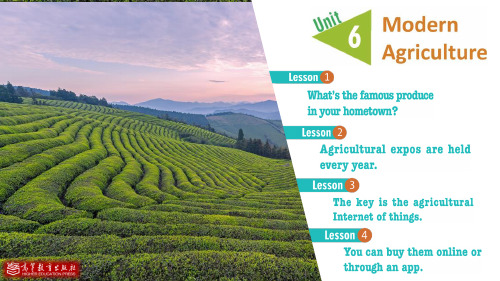
Unit 6
If we want to participate, what should we do? 如果我们想参加,我们该怎么 做? Everyone can participate in this game. 每个人都能参加这游戏。
Unit 6
corn 玉米 turnip 萝卜 crab 螃蟹 peach 桃 green onites 枣 beans 大豆 fish 鱼 garlic 大蒜
Unit 6
A: I remember your hometown is in Weifang. B: Yes, it is an inland city. A: There must be rich produce in your hometown. B: Yes, there are all kinds of vegetables and fruits. A: What’s the famous produce in Weifang? B: It’s famous for turnips. A: Have farmers in your hometown used computer in farming? B: They use computerized machines to plant vegetables and fruits.
computerized machines to grow fruits and vegetables, raise 4) livestock .
and 5) marine
products.
Liu Fang: That’s great. I want to go there at once.
中职教材英语(拓展模块)电子试题附答案unit 6
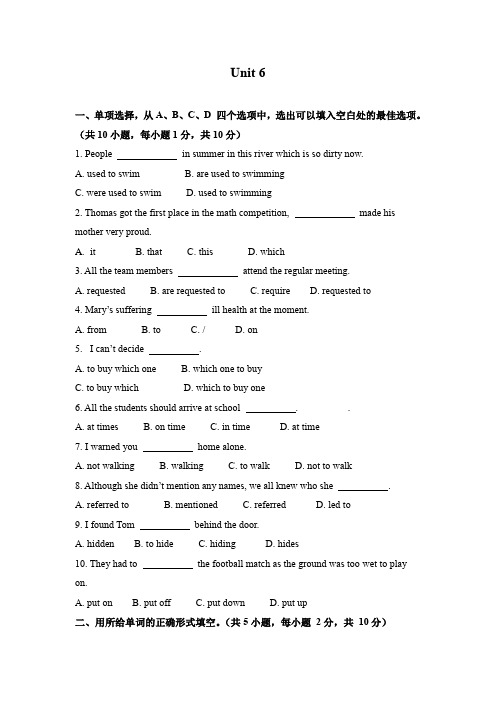
Unit 6一、单项选择,从A、B、C、D 四个选项中,选出可以填入空白处的最佳选项。
(共10小题,每小题1分,共10分)1. People in summer in this river which is so dirty now.A. used to swimB. are used to swimmingC. were used to swimD. used to swimming2. Thomas got the first place in the math competition, made his mother very proud.A.itB. thatC. thisD. which3. All the team members attend the regular meeting.A. requestedB. are requested toC. requireD. requested to4. Mary’s suffering ill health at the moment.A. fromB. toC. /D. on5. I can’t decide .A. to buy which oneB. which one to buyC. to buy whichD. which to buy one6. All the students should arrive at school . .A. at timesB. on timeC. in timeD. at time7. I warned you home alone.A. not walkingB. walkingC. to walkD. not to walk8. Although she didn’t mention any names, we all knew who she .A. referred toB. mentionedC. referredD. led to9. I found Tom behind the door.A. hiddenB. to hideC. hidingD. hides10. They had to the football match as the ground was too wet to play on.A. put onB. put offC. put downD. put up二、用所给单词的正确形式填空。
职高英语拓展模块(1_6单元)试题库完整
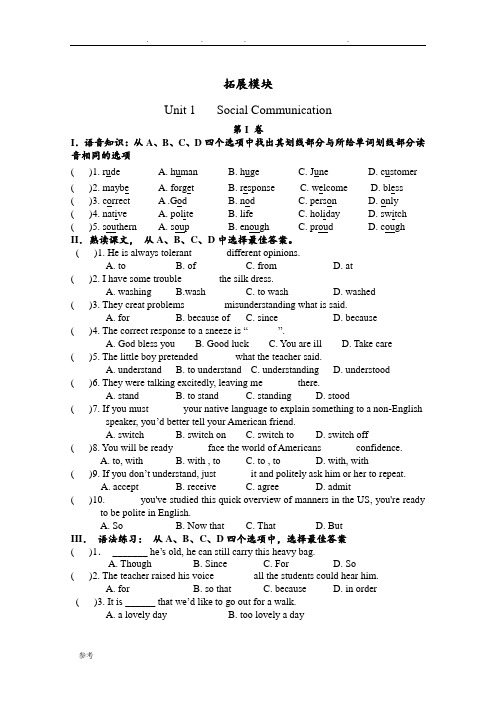
拓展模块Unit 1 Social Communication第I 卷I.语音知识:从A、B、C、D四个选项中找出其划线部分与所给单词划线部分读音相同的选项( )1. rude A. human B. huge C. June D. customer ( )2. maybe A. forget B. response C. welcome D. bless ( )3. correct A .God B. nod C. person D. only ( )4. native A. polite B. life C. holiday D. switch ( )5. southern A. soup B. enough C. proud D. cough II.熟读课文,从A、B、C、D中选择最佳答案。
( )1. He is always tolerant ______ different opinions.A. toB. ofC. fromD. at( )2. I have some trouble _______the silk dress.A. washingB.washC. to washD. washed( )3. They creat problems _______ misunderstanding what is said.A. forB. because ofC. sinceD. because( )4. The correct response to a sneeze is “______”.A. God bless youB. Good luckC. You are illD. Take care ( )5. The little boy pretended _______what the teacher said.A. understandB. to understandC. understandingD. understood( )6. They were talking excitedly, leaving me ______ there.A. standB. to standC. standingD. stood( )7. If you must ______ your native language to explain something to a non-English speaker, you’d better tell your American friend.A. switchB. switch onC. switch toD. switch off( )8. You will be ready ______ face the world of Americans ______ confidence.A. to, withB. with , toC. to , toD. with, with( )9. If you don’t understand, just ______ it and politely ask him or her to repeat.A. acceptB. receiveC. agreeD. admit( )10. ______ you've studied this quick overview of manners in the US, you're ready to be polite in English.A. SoB. Now thatC. ThatD. ButIII.语法练习:从A、B、C、D四个选项中,选择最佳答案( )1._______ he’s old, he can still carry this heavy bag.A. ThoughB. SinceC. ForD. So( )2. The teacher raised his voice _______ all the students could hear him.A. forB. so thatC. becauseD. in order( )3. It is ______ that we’d like to go ou t for a walk.A. a lovely dayB. too lovely a dayC. so lovely a dayD. such lovely a day( )4. Mary had ______ much work to do that she stayed at her office all day.A. suchB. soC. tooD. very( )5. _____ she goes, there are crowds of people waiting to see her.A. WhereverB. HoweverC. WhicheverD. Whoever ( )6. You must speak louder ______ you can be heard by all.A. so thatB. in order toC. becauseD. such that ( )7. ______ well you can drive, you must drive carefully.A. So long asB. In order thatC. No matter howD. The moment( )8. If we work with a strong will, we can overcome any difficulty, ____great it is.A. whatB. howC. whateverD. however ( )9. _______ he’s very young, _______ he knows several languages.A. Though, butB. Because, soC. Though, /D. Because, / ( )10. _____ I suggest, he always disagrees.A. HoweverB. WhateverC. WhicheverD. WhoeverIV. 完形填空:Last summer, my wife Jane and I went to visit the town where we both grew up. We1 there since we were married ten years ago.2 , we went to the neighborhood where my wife spent her childhood. It hadn’t changed very much. The house3 she was born was still there, but it was now a different color. The same neighbors still lived next door. They were very glad to4 Jane, and asked us to come in and have a cup of coffee. We learned about all the neighbors, old and new. Jane had a very good5 . As fast as one question was answered, she would ask the next. “What happened6 the Dunbars who used to have the little yellow house on the corner?”, “Who bought the old Johnson place in the next block?”, “Do Fred and Martha still live down the street?”, “What about Miss Burton who7 in that extremely big house around the corner?”Then we went to see the neighborhood where I grew up. What a 8 ! It was all changed. All the old houses I remembered were 9 and in their place were some very modern ones. I didn’t know any of the people who 10 there.( ) 1. A. hadn’t been B. wasn’t C. haven’t been D. didn’t be( ) 2. A. At the very beginning B. First C. Firstly D. For the first time ( ) 3. A. that B. / C. where C. which( ) 4. A. find B. know C. meet D. see( ) 5. A. time B. ask C. home D. question( ) 6. A. with B. to C. for D. about( ) 7. A. live alone B. lives lonely C. lived alone D. stayed lonely( ) 8. A. disappoint B. disappointing C. disappointed D. disappointment ( ) 9. A. gone B. ruins C. there D. the same( ) 10. A. worked B. stayed C. studied D. livedV. 阅读理解AEducation for Japanese children is free for the first nine years and all children must go to school six years of primary schooling and three years of secondary schooling. In the primary and secondary schools, about 99.9 per cent of school-age children are present. School usually begins at 8 o'clock in the morning and ends at 3 o'clock in the afternoon on weekdays and at noon on Saturdays. The school begins in April and ends in March. There is a summer holiday in August and a winter holiday during the New Year season.After nine years of schooling, students can enter the three-year high school by passing an examination and by paying a small charge each year. After high school, students can go on to study at various types of colleges, usually for four years. There are also two-year junior colleges.( ) 1. The passage mainly discusses about ______.A.c olleges in JapanB.free education in Japancation in Jap anD.s chool time in Japan( ) 2. How many days have the Japanese students to go to school every week?A.N ot known.B.Four and half days.C.Five days.D.F ive and a half days.( ) 3. If a student wants to go to a high school in Japan, he or she must ______.A.p ay a large amount of moneyB.study at primary and secondary school for 9 yearsC.take part in (参加) the exam and pay a little moneyD.p ass the exam and pay a little money( ) 4. What is mentioned in the passage?A.T ypes of colleges.B.Perio ds for different schoolings.C.The teaching staff (教职员工).D.T he number of children attending schools.( ) 5. According to the passage what is true?A.A lmost all Japa nese children have school education.B.Japanese schools have three vacationsC.Japanese children have freedom to choose schools.D.W eekdays are from Monday to Sunday.BFrom a plane we can see the fields, cities, mountains or seas below. If we go intospace, we see more and more of the earth. People and man-made satellites have been sent out into space to look at the earth carefully and people have learnt more about the earth in the last few years.The sea looks very beautiful when the sun is shining on it. But it can be very terrible when there is a strong wind.The sea is very big. It nearly covers three quarters of the earth. The sea is also very deep in some places. There is one place and at that place the sea is about 11 kilometers deep. The highest mountain in the world is about 9 kilometers high. If that mountain was put into the sea at that place, there would be still 2 kilometers of water above it!In most parts of the sea, there are many kinds of fishes and plants. Some live near the top of the sea. Others live deep down. There are also a lot of small living things, and lots of fishes live by eating them.The sea can be very cold. When people go down, the sea becomes colder and colder. Only some men can go down into the deep sea. But, in 1970, five women scientists (科学家) lived in the deep sea for fourteen days.()6. This passage is_________.A. a short storyB. for science readingC. a piece of newsD. a report()7. The sea covers about _______of the earth.A One third B. One fourthC. Two quartersD. Three fourths()8. _______are not mentioned (提及) in this passage.A. IslandsB. FishesC. PlantsD. Living things()9. Which of the following is NOT true?A. The sea is usually beautiful when the sun is shining.B. The sea is always very terrible when the wind blows hard.C. The highest mountain is in the deepest place of the sea.D. The deeper the people go into the sea, the colder they will feel.()10. The last sentence “But, in 1970, five women scientists live d in the deep sea for fourteen days.” means that________.A. women wanted to live in the deep sea for a long timeB. women could go deeper into the sea than menC. women liked living in the deep sea better than menD. women could do the same work as men第II卷I.单词拼写:根据下列句子及所给汉语注释,在横线上写出单词的正确形式1. No matter what we said, he ______(假装)that he knew nothing about it.2. The ________( 观众) enjoyed every minute of the performance.3. The naughty boy ________(承认)that did it with his father’s help.4. Sorry,I can’t __________(解释)why I am engaged in that job.5. The best way to practice English is to talk with a _________( 本国的) speaker. II.词形变换:用括号内单词的适当形式填空1.I became ________(annoy) when I felt that he pretended to understand what Imeant.2.He _____(polite)asked the man to give a correct response.3.Work hard and you’ll have _________ (confident ) to face the challenge of life.4.The boy felt _____ (lose)when he heard something he didn’t understand.5.She created some problems because of _______(misunderstand) what her boss said. III.词义搭配:从B栏中选出A栏单词的正确解释A B( ) 1.tolerant A. man, woman or child, not an animal( ) 2. rude B. say or do something again( ) 3. native C. sudden burst of air from the nose and mouth ( ) 4. repeat D. accepting what one doesn’t like( ) 5. human E. belonging to or being the place of one’s birth ( ) 6. conversation F. fit, right( ) 7. admit G. informal talk( ) 8. sneeze H. agree to the truth of usually something bad ( ) 9. suitable I. an answer or an action done in answer( ) 10. response J. not politeIV.补全对话。
新教材高中英语单元形成性评价(六)Unit6Atonewithnature练习(含解析)

单元形成性评价(六)Unit 6(120分钟150分)第一部分听力(共两节, 满分30分)第一节(共5小题; 每小题1. 5分, 满分7. 5分)听下面5段对话。
每段对话后有一个小题, 从题中所给的A、B、C三个选项中选出最佳选项。
听完每段对话后, 你都有10秒钟的时间来回答有关小题和阅读下一小题。
每段对话仅读一遍。
Text 1M: Wow! What a beautiful city! Why don’t we first visit the art gallery and t hen go to the zoo?W: To tell you the truth, I’m not really interested in going there. ①You know, there are some nice places to buy souvenirs.1. What is the woman willing to do?A. Visit a gallery.B. Go shopping.C. Visit a zoo.答案: BText 2M: I’d like to make an appointment to see Dr. Carter. Is it possible to make it early, like 7: 30 am?W: No, I am sorry. Um . . . how about Tuesday at 8: 00 am ②or Thursday at 8: 15 am? M: Well, ②in that case, Thursday would be fine.2. When will the man meet Dr. Carter?A. At 7: 30 am.B. At 8: 00 am.C. At 8: 15 am.答案: CText 3W: Hello, Mr Fred. This is Sunshine.M: What’s the trouble with you, Ms Sunshine?W: ③My car broke down just now on Robertson Road. I need your help.3. Where is the woman?A. In a garage.B. In an office.C. In a street.答案: CText 4W: ④I don’t understand the math problem on the board. Can you help me?M: ④I’m kind of busy working on my homework. Why don’t you ask the teacher to help you?4. What is the relationship between the speakers?A. Classmates.B. Parent and child.C. Teacher and student.答案: AText 5W: All the plants in my garden died! I don’t know what happened. I watered them a lot and fed them plant food. What did I do wrong?M: ⑤Maybe th e garden wasn’t in enough sun. You did plant them on the side of the house that gets the most shade.5. What did the woman’s plants die from, according to the man?A. From not enough water.B. From not enough sun.C. From not enough plant food.答案: B第二节(共15小题; 每小题1. 5分, 满分22. 5分)听下面5段对话或独白。
PEP人教版小学六年级上册英语第六单元拓展试题及答案

六年级第六单元课外拓展阅读训练一、读短文,判断下列句子是否正确,正确的写(T)错误的写(F)。
It is a sunny morning. Robin is going to sit on the grass when he hears, “Wait!” It is a little ant. He is afraid. “Please don’t sit on me. One day I can help you.” “Don’t worry, little ant. I won’t sit on you ,” says Robin.The next day, it is raining. Robin is in the park. He is stuck in the mud. He is worried. Then he hears, “Let us help you !” It is the ant and all of his friends. They are strong. They pull Robin out of the mud.Everyone is happy!( ) 1. Robin is going to sit on the grass on a rainy morning.( ) 2. Robin sits on the little ant.( ) 3.The next day, it is raining.( ) 4. Robin is stuck and worried.( ) 5. Everyone isn’t happy!二、读短文,判断下列句子是否正确,正确的写(T)错误的写(F)。
My father is ill. He should see a doctor this morning. So we can’t go to the zoo today. But we can go next time. My dad doesn’t feel well now. We should go to the hospital.( ) 1.My mother is ill.( ) 2.We can go to the zoo today.( ) 3.We can go to the zoo next time.( ) 4.My father feels well now.( ) 5.My father should see a doctor.三、阅读短文完成表格。
高教版中职英语(拓展模块)Uint 6《Keeping Fit》word教学设计

中等职业学校英语拓展模块Unit6Keeping Fit作者及工作单位王蕊北京新城职业学校一.教材分析本课是中等职业学校拓展模块Unit6 Keeping Fit第一课时。
本单元的中心话题是危害健康的各种疾病和如何保持健康,本课时是要掌握生活习惯和健康的关系,哪些是好的,对健康有益的生活习惯,哪些不好的,对健康有危害的生活习惯,不好的怎么来改正。
主要语言结构为:情态动词should和should not是本节重点,要求学生能够用should和should not 给他人提建议。
通过本课的学习进一步培养学生养成良好的生活习惯和保持健康的重要性的意识。
二.学情分析我教学的对象是中职二年级的学生,学生一小部分基础属于中上水平,中下水平的占了相当一部分,他们学习英语既感到好奇又担忧,希望能得到他人的肯定。
因此我在教学活动中尽量让他们参与到活动中来,有更多的机会来说英语,减少他们的恐惧感,通过学生间的合作学习,降低他们的学习难度,使他们体验到成功的喜悦。
同时自主学习和小组交流中加以落实,提高他们综合运用语言的能力,使各层次的学生都有所收获。
三.教学目标1.知识目标:1)词汇: 学生能够识读balanced、gym、overweight、fitness、junk、lung cancer,、tobacco、appetite等词汇。
2) 句型: 学生会使用You should/ shouldn’t… 的句型给别人建议。
2.语言技能目标:学生能简单使用所学句型给别人关于如何保持身体健康的一些建议,并通过此课程为自己设立一个健康的生活计划。
3.情感态度目标:1)培养学生对生活的热爱,养成良好的生活习惯。
2)能通过自己的知识帮助别人,培养学生的自信心。
四.教学重点和难点教学重点:词汇、词组搭配和句型的运用。
教学难点:You should/ shouldn’t…/You may not…/You are not to…/You may begin to…等句型的学习,并能在实际情景中简单地运用以上句型来给别人建议。
外研版八年级英语下册Module6模块练习题及其详细答案
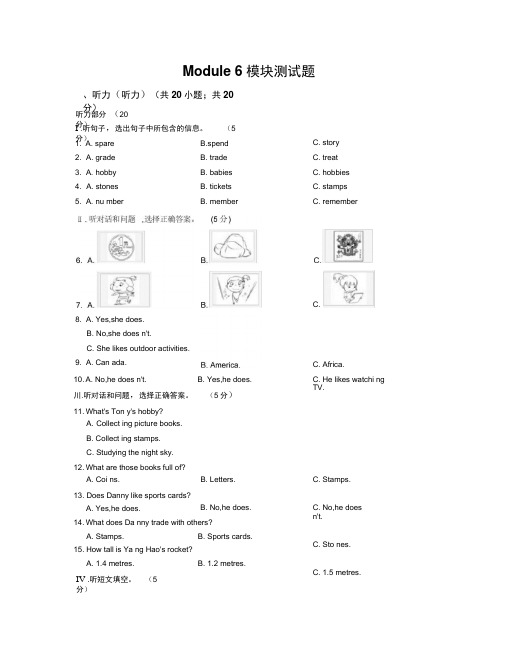
Module 6模块测试题、听力(听力)(共20小题;共20 分)听力部分 (20分)I .听句子,选出句子中所包含的信息。
(5分) 1. A. spare 2. A. grade 3. A. hobby 4. A. stones 5. A. nu mber B.spend B. trade B. babies B. tickets B. member C. story C. treat C. hobbies C. stamps C. remember8. A. Yes,she does. B. No,she does n't.C. She likes outdoor activities. 9. A. Can ada.C.10. A. No,he does n't. B. Yes,he does. 川.听对话和问题,选择正确答案。
(5分)11. What's Ton y's hobby? A. Collect ing picture books. B. Collect ing stamps. C. Studying the night sky. 12. What are those books full of? A. Coi ns. B. Letters. C. Africa.C. He likes watchi ngTV.13. Does Danny like sports cards? A. Yes,he does. B. No,he does.14. What does Da nny trade with others? A. Stamps. B. Sports cards. 15. How tall is Ya ng Hao's rocket? A. 1.4 metres. B. 1.2 metres. C. Stamps.C. No,he doesn't.C. Sto nes.C. 1.5 metres.IV .听短文填空。
- 1、下载文档前请自行甄别文档内容的完整性,平台不提供额外的编辑、内容补充、找答案等附加服务。
- 2、"仅部分预览"的文档,不可在线预览部分如存在完整性等问题,可反馈申请退款(可完整预览的文档不适用该条件!)。
- 3、如文档侵犯您的权益,请联系客服反馈,我们会尽快为您处理(人工客服工作时间:9:00-18:30)。
在古代,中国是东亚的文明主导。
返回首页
In (ancient) times, China was East Asia’s dominant civilization. Other Societiesnotably the Japanese, Koreans, Tibetans, and Vietnamese –were strongly (influenced) by China, adopting features of Chinese art, food, material culture, philosophy, government, technology, and written language. For many centuries, especially from the 7th through the 14th century AD, China had the world’s most advanced civilization. 返回首页
发明,如纸张,印刷,火药,瓷器,丝绸, 和指南针起源于中国,然后流传到世界其 他地区。 返回首页
(Inventions) such as paper, printing, gunpowder, porcelain, silk, and the compass originated in China and then spread to other parts of the world. China’s success beginning under the great Tang dynasty (618-907) would prove to be the longest lasting period of success in world (history). Indeed, the Tang dynasty (is regarded) by many historians as the most glorious period of China’s long history.
Unit 6
英语拓展模块练习册完形Unit 6译文
1段 (1)
1段 (2)
2段 (1)
2段 (2)
制作:心海0926
In (ancient) times, China was East Asia’s dominant civilization. Other Societiesnotably the Japanese, Koreans, Tibetans, and Vietnamese –were strongly (influenced) by China, adopting features of Chinese art, food, material culture, philosophy, government, technology, and written language. For many centuries, especially from the 7th through the 14th century AD, China had the world’s most advanced civilization.
它延续到宋、明两代的早期现代。
返回首页
The years during which the Tang Empire experienced its greatest power established a pattern for China. It continued throughout the Song and Ming dynasties into early modern (times) . Tang rule set a standard mark on many facts of Chinese life, (including) literature and the arts. For this reason, Tang China was admired and copied by many other peoples.
返回首页
In (ancient) times, China was East Asia’s dominant civilization. Other Societiesnotably the Japanese, Koreans, Tibetans, and Vietnamese –were strongly (influenced) by China, adopting features of Chinese art, food, material culture, philosophy, government, technology, and written language. For many centuries, especially from the 7th through the 14th century AD, China had the world’s most advanced civilization.
事实上,唐代被许多历史学家认为是中国 历史上最辉煌的时期。
返回首页
The years during which the Tang Empire experienced its greatest power established a pattern for China. It continued throughout the Song and Ming dynasties into early modern (times) . Tang rule set a standard mark on many facts of Chinese life, (including) literature and the arts. For this reason, Tang China was admired and copied by many other peoples.
返回首页
The years during which the Tang Empire experienced its greatest power established a pattern for China. It continued throughout the Song and Ming dynasties into early modern (times) . Tang rule set a standard mark on many facts of Chinese life, (including) literature and the arts. For this reason, Tang China was admired and copied by many other peoples.
唐帝国在这几年中拥有过最大的权力,为 中国建立了一个格局。
返回首页
The years during which the Tang Empire experienced its greatest power established a pattern for China. It continued throughout the Song and Ming dynasties into early modern (times) . Tang rule set a standard mark on many facts of Chinese life, (including) literature and the arts. For this reason, Tang China was admired and copied by many other peoples.
返回首页
(Inventions) such as paper, printing, gunpowder, porcelain, silk, and the compass originated in China and then spread to other parts of the world. China’s success beginning under the great Tang dynasty (618-907) would prove to be the longest lasting period of success in world (history). Indeed, the Tang dynasty (is regarded) by many historians as the most glorious period of China’s long history.
其他国家特别是日本、韩国,西藏和越南深受中 国的强烈影响,采用中国艺术、饮食,物质文化, 哲学, 政府, 技术和文字语言的特点。
In (ancient) times, China was East Asia’s dominant civilization. Other Societiesnotably the Japanese, Koreans, Tibetans, and Vietnamese –were strongly (influenced) by China, adopting features of Chinese art, food, material culture, philosophy, government, technology, and written language. For many centuries, especially from the 7th through the 14th century AD, China had the world’s most advanced civilization.
几个世纪以来,特别是从公元第七到第十 四世纪,中国拥有世界上最先进的文明。
返ቤተ መጻሕፍቲ ባይዱ首页
(Inventions) such as paper, printing, gunpowder, porcelain, silk, and the compass originated in China and then spread to other parts of the world. China’s success beginning under the great Tang dynasty (618-907) would prove to be the longest lasting period of success in world (history). Indeed, the Tang dynasty (is regarded) by many historians as the most glorious period of China’s long history.
